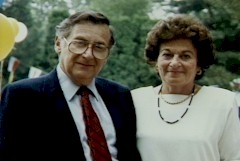 |
Kurt Klein with his wife, Gerda.
AP April 25, 2002 - With the simplest of gestures – a door held open, a gentle voice – Kurt Klein and Gerda Weissmann brought a sense of humanity to a scene of horror. He was a US Army lieutenant. She, one day shy of her 21st birthday, at 68 pounds, with gray hair, at the end of a 300-mile death march, was a Holocaust survivor. Their first encounter outside a booby-trapped warehouse in Europe on May 7, 1945, blossomed into a 57-year love affair with a tireless mission: to battle intolerance and hunger and to turn heartache into hope for generations ranging from Holocaust victims to Columbine High School survivors. Mr. Klein died Friday in Guatemala on a lecture tour to deliver their message of hope. He was 81.
"Their life together was like a fairy tale," their friend from Buffalo, Ruth Kahn Stovroff, told The Buffalo News. "They carried a message around the world… how you can turn any horrible degree of evil into good, with enough courage and faith."
Following Mr. Klein’s retirement in the late 1980s, the couple moved to Scottsdale, Arizona, established the Gerda and Kurt Klein Foundation, and spread their message through an international lecture tour. Their story was also retold in a variety of settings. Gerda Klein was the subject of HBO’s Academy-Award winning documentary "One Survivor Remembers," in which she delivers a quiet, personal, shattering account of her three years in a concentration camp. She also wrote a book about her experiences and liberation called All But My Life, for which Mr. Klein was the editor. The two are featured prominently in videotapes shown at the Holocaust Museum in Washington, DC.
Born in Germany, Kurt Klein was forced to leave school shortly after his bar mitzvah as conditions worsened for Jews. He taught himself English by reading about America, and when he was 16, his parents sent him to the United States. Mr. Klein arrived in Buffalo with $10 in his pocket and worked as a typesetter, dishwasher, and cigar store clerk to help pay for his parents’ passage from Germany. They made it as far as France, but efforts to get US visas were snarled by red tape and a lack of interest by US Embassy officials, and the war caught up with them. They were sent to Auschwitz, where they died. Mr. Klein’s efforts to save them from the Nazis were recounted in the PBS film, "America and the Holocaust: Deceit and Indifference."
Mr. Klein joined the US Army and fought against his homeland. As the war dragged to a close and hundreds of thousands of Germans began surrendering, US intelligence agents tapped his ability to speak German. He was on patrol when he heard that a group of concentration camp survivors had been found near a warehouse.
That group included Gerda Weissmann. After three years in a German concentration camp, Gerda had been forced to march with 2,000 other camp survivors toward Czechoslovakia. By early May, when SS officers abandoned them in a booby-trapped warehouse and joined the German retreat, only 150 of them were still alive.
"All of a sudden, I saw a strange car coming down the hill, no longer green, not bearing a swastika, but a white star," Mrs. Klein later said of the US jeep. When Lieutenant Klein walked up to her, he asked if anyone spoke German or English. Her response was a warning. "We are Jewish, you know," she said in German. She said the soldier hesitated. "Then his own voice sort of betrayed his own emotion and he said, ‘So am I,’" she later recounted. "It was the greatest hour of my life." "Then he asked an incredible question: ‘May I see the other ladies?’ It was a form of address I hadn’t heard in six years. Then he held the door for me and let me precede him and in that gesture restored me to humanity."
When she took him inside to stand among the sick and dying young women, she made an encompassing gesture with her hand and said, "Noble be man, merciful and good." The soldier recognized the words. "What shocked me was that she could recall the opening lines of a poem by Goethe under those unspeakable conditions," he recalled.
In addition to bringing his future wife to safety, Lieutenant Klein also helped arrange safe passage into American hands for a group of suspected German prisoners who turned out to be concentration camp escapees.
Page created on 4/22/2005 1:57:52 PM
Last edited 1/8/2020 9:58:17 PM
